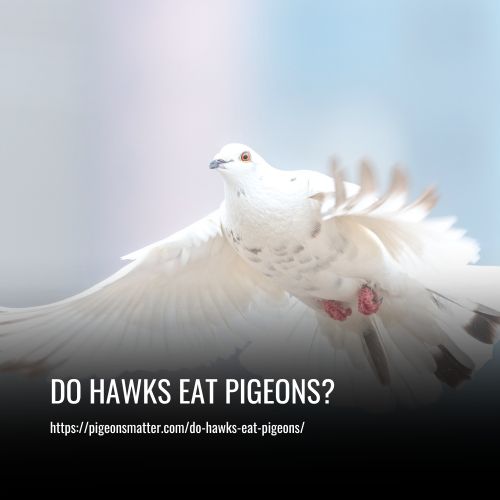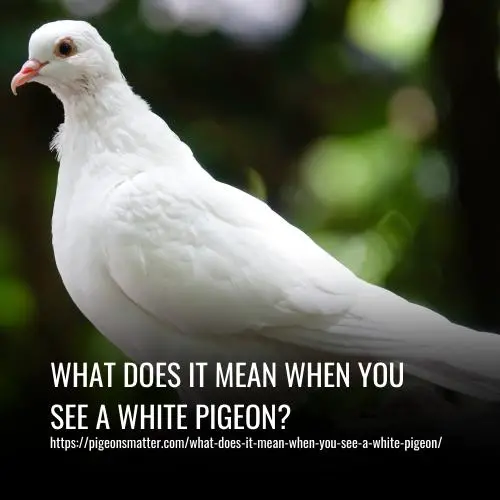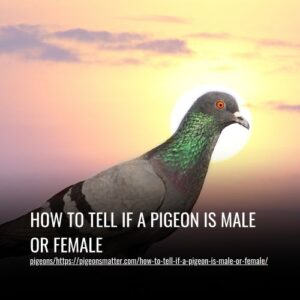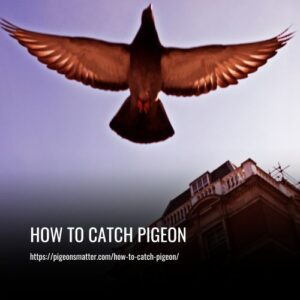Yes, hawks do eat pigeons as they are one of their many natural prey. Pigeons are easily accessible and abundant, making them easy targets for hawks. Pigeons are not known for their aggressiveness and are slower in flight, making them vulnerable to predator birds like hawks.
Hawks can eat the whole pigeon, including the meat, bones, and feathers, either on the spot or carry them to their nest tree. A hawk can consume up to 8 medium-sized birds in a day, depending on its size and hunger level. The ferruginous hawk, which is the world’s largest bird, can feed on a single rock pigeon and remain full for several days.
However, small hawks like the Cooper Hawk can survive on one large pigeon per day, while they may need to eat more bird feeders if the pigeons are small-sized birds.

Do Hawks Eat Dead Pigeons?
Hawks are known for their varied diet, which can include rodents, snakes, and especially pigeons.
In urban areas, where pigeons are often seen as pests, hawks are appreciated for helping to control their populations. However, not all hawks will eat their prey immediately. Some will store their catch in a tree or on a ledge, returning to it later when they need to eat.
This behavior, known as cache hoarding, is a survival strategy that helps hawks to survive lean times when food is scarce. So, while hawks may be viewed as predators, their role in the ecosystem is an important one.
Do Hawks Eat The Entire Animal?
Hawks belong to the category of birds of prey and possess sharp talons and beaks that they use for hunting and consuming other animals. In North America, the term ‘hawk’ usually refers to accipitrine birds, such as Cooper’s hawk and red-tailed hawk.
Contrary to popular belief, hawks do not always consume their prey whole. Instead, many hawks will tear their prey into smaller pieces before eating it. This behavior is likely because hawks often eat larger animals than they can swallow whole. By tearing their prey into smaller pieces, hawks can more easily digest their food and extract the nutrients they need.
Overall, while hawks are certainly capable of swallowing small prey whole, tearing their food into smaller pieces is more common and practical for these impressive birds of prey.
Do Hawks Eat Pigeon Eggs?
Hawks are skilled predators and have a diverse diet consisting of animals they can easily catch. Smaller hawks may feed on insects, while larger ones primarily hunt rodents, rabbits, and snakes.
In addition to these prey, some hawks also hunt birds, especially pigeons. Pigeon eggs are a significant part of their diet, as they are small, easily swallowed, and provide a good source of protein and fat. Some species of hawks are particularly fond of pigeon eggs and may even raid their nests to find them.
While pigeon eggs are not the only food that hawks eat, they are an important part of their diet. So, it is not uncommon to see hawks preying on pigeons or searching for their eggs. As predators, hawks play a crucial role in maintaining a balance in the ecosystem.
How Often Do Hawks Eat Pigeons?
Hawks are skilled hunters that typically hunt for food every day. Their diet consists mainly of pigeons, with a single hawk capable of consuming up to four in a day. In areas where pigeons are abundant, hawks may hunt several times a day, while in other areas, they may only hunt every few days.
Despite their important role in controlling the population of pigeons, hawks are often seen as pests by farmers and some bird enthusiasts. However, some people recognize their ecological significance and appreciate their contribution to maintaining a balanced ecosystem.
Regardless of one’s perspective, it’s clear that hawks are effective predators and an integral part of the food chain. The diet of pigeons is an essential aspect of their ecology, and without them, the population of pigeons could quickly get out of control in many urban areas.
How Do Hawks Kill Pigeons?
Hawks typically use their sharp talons and beaks to kill pigeons. Hawks will usually seize the pigeon with their talons and then use their beak to inflict a fatal wound.
1. Using talons or claws:
Hawks are known to attack backyard bird feeders, and their sharp talons are one of the main ways they do so.
With four strategically placed talons, including three front-facing and one backward-facing, a hawk can use its claws to pierce through the skin of its prey, killing it quickly.
If you notice hawks in your area, it’s important to take steps to protect your backyard birds and feeders, such as using netting or keeping the feeders in a more sheltered area.
2. Biting using their sharp beaks:
Hawks are formidable predators that use both their sharp talons and beaks to kill their prey. When hunting pigeons, hawks will often use a combination of these weapons to catch and kill their prey.
The sharp talons are used to grab and hold the pigeon while the sharp beak is used to deliver a fatal blow. This combination of weapons makes hawks highly effective hunters and dangerous predators in the wild.
3. Choking using its strong feet:
Hawks have specialized tendons in their feet that allow them to easily lock into place. This allows them to firmly grip their prey, such as a pigeon, and prevent it from escaping.
The strength of grip is so strong that the pigeon eventually dies from a lack of airflow. This method of hunting is an effective way for hawks to secure their food source.
4. Breaking the neck of the pigeon:
Hawks are known to kill pigeons in various ways, one of which is by breaking off their neck. The hawk wraps its feet around the pigeon’s neck and applies pressure, causing the neck to break and killing the bird instantly.
This method is quick and efficient, allowing the hawk to quickly capture its prey.
How Many Pigeons Do Hawks Eat Per Day?
Birds of prey, such as hawks, have varying diets based on their age, gender, body weight, and the availability of pigeons. Young and growing hawks typically require more food than adult hawks, while female hawks need more meat than males due to their larger size.
The Ferruginous hawk, which is the largest hawk species, can eat up to 8 pigeons a day, consuming as much as 180 grams of meat daily. Meanwhile, Cooper’s hawk, a smaller species, requires only around 90 grams of meat per day, equivalent to about 3 pigeons. The number of pigeons a hawk eats varies based on these factors and the availability and size of the pigeons.
Does Cooper’s Hawk Eat Pigeons?
Cooper’s hawks are known for being bird hunters, making them unwelcome visitors at bird feeders. They typically prey on small to medium-sized birds, including pigeons, doves, songbirds, woodpeckers, and quails. Of these, they particularly enjoy the taste of pigeons and can often be seen feeding on them on rooftops and ledges in urban areas.
Cooper’s hawks capture their prey with their feet and kill them through repeated squeezing using their tendons. If you have a bird feeder and notice Cooper’s hawk in the area, it’s best to take steps to discourage them from hunting in your yard to protect your feathered friends.
How Common Are Hawk Attacks On Pigeons?
Pigeon owners have expressed concern about the increasing number of birds of prey and their potential threat to their birds. However, a government survey found that only 14% of lost pigeons were due to predation. Other threats to pigeons include bad weather, straying, collisions, and domestic cats.
Trained hawks are sometimes used by pest control companies in the UK to catch pigeons. This practice has added to the concerns of pigeon owners about the increase in predatory raptors in urban areas. It’s important to note that DEFRA does not support this method of pigeon control, and culling pigeons (and other wild birds) requires a license.
Which Hawks Eat Pigeons?
Many hawks are known to feed on pigeons, including the Red-tailed hawk, Cooper’s hawk, and Ferruginous hawk. The Red-tailed hawk is common across North America and can be found preying on pigeons in many urban areas.
- Sparrowhawks: Sparrowhawks are known for their method of killing pigeons by squeezing them under their feet and stabbing them with their sharp claws. Although both male and female sparrowhawks hunt pigeons, female sparrowhawks are more likely to prey on pigeons due to their larger size. This hunting behavior is important for sparrowhawks to maintain their survival and is a natural part of their ecological role in the ecosystem.
- Goshawks: This bird of prey found in North America is a skilled hunter of pigeons. Equipped with a hooked beak and sharp talons, it can catch its prey with ease. In addition, these birds use their broad wings to catch pigeons in flight, making them formidable predators.
- Cooper’s hawk: Male cooper hawks are typically too small to prey on pigeons, but female cooper hawks, which are larger, can often be found hunting for pigeons in city parks. These birds of prey use their feet to kill their prey, repeatedly squeezing them until they are no longer able to struggle.
- Red-tailed hawk: Red-tailed hawks are known to eat pigeons, although they are not commonly seen in backyard settings. The hawks possess strong talons which are utilized to catch and eliminate their prey.
- Harrier hawks: Harrier hawks are known to fly low in search of prey, although pigeons are not their primary food source. If the chance arises, they will not hesitate to hunt pigeons.
Humane Tips to Prevent Hawk Attacks on Pigeons
If you have pigeons or enjoy watching them in your backyard, it’s important to protect them from hawk attacks. Here are some tips to keep your pigeons safe without harming the hawks.
- Provide Cover: Hawks like to attack from above, so providing cover for your pigeons can help protect them. Planting trees or adding birdhouses can provide shelter and hiding places for your pigeons.
- Use Reflective Objects: Hawks are deterred by reflective objects, so hanging CDs or other shiny objects around your yard can help keep them away.
- Install Netting: Netting can be installed over your pigeon’s area to prevent hawks from attacking them. Make sure the netting is strong and securely fastened to prevent any accidents.
- Keep the Area Clean: Hawks are attracted to areas with an abundance of food sources. Keeping your yard clean and free of debris can help reduce the number of hawks in the area.
- Provide a Hawk Perch: Providing a hawk perch in your yard can help keep them away from your pigeons. Hawks like to perch and look out for prey, so giving them a designated area can keep them from attacking your pigeons.
Remember, it’s important to protect your pigeons without causing harm to the hawks. These tips can help provide a safe environment for both your pigeons and the hawks in your area.
How To Stop Hawk Attacks On Pigeons (Things You’ll Need)
Hawks can be a real problem for pigeon enthusiasts, but there are ways to protect your feathered friends without resorting to violence.
Removing bird feeders for a few days can help deter hawks from sticking around your pigeon’s feeding area. Placing feeders near natural protection like shrubs can also offer a quick escape for your birds. Keeping your pigeons in good shape by flying them regularly and not overfeeding them can make them less of a target for hungry hawks.
Training your birds to return directly to the loft and feeding crows can also help keep hawks at bay. Hanging hawk balls and unwanted CDs in the area can also reflect light and scare off any would-be predators. Remember, it’s important to protect your pigeons without harming any other animals in the process.
FAQs
Peregrine falcons, sparrowhawks, and cooper’s hawks are frequently seen hunting pigeons, while sparrowhawks have been observed targeting racing pigeons.
The quantity of food that a hawk consumes is influenced by its species and the age and species of the pigeon it preys on. Certain hawks are capable of consuming up to eight small pigeons in a day, whereas others, such as the Ferruginous, may only require one mature rock pigeon to survive for a few days.
Pigeons exhibit a natural fear response towards predators such as owls and hawks but do not show any fear toward humans. This may be why they are often sighted in urban areas.
Certain hawk species may face difficulties carrying certain pigeons due to their weight.
Hawks hunt baby pigeons without hesitation. This is because young birds have smaller wingspans and cannot fly as fast as adults. As a result, they are easier to catch and become a meal for the predator.
Roadside hawks are carnivores and can consume pigeons, but their main diet is made up of large insects such as cicadas, beetles, grasshoppers, and dragonflies.
Conclusion:
The answer to the question “Do hawks eat pigeons?” is a resounding yes. But it’s important to remember that hawks are an important part of the ecosystem and play a crucial role in controlling populations of smaller animals.
So while it may be difficult to witness a hawk preying on a pigeon, it’s important to appreciate the balance that nature has created. And who knows, maybe you’ll even start to see these majestic birds in a new light.


